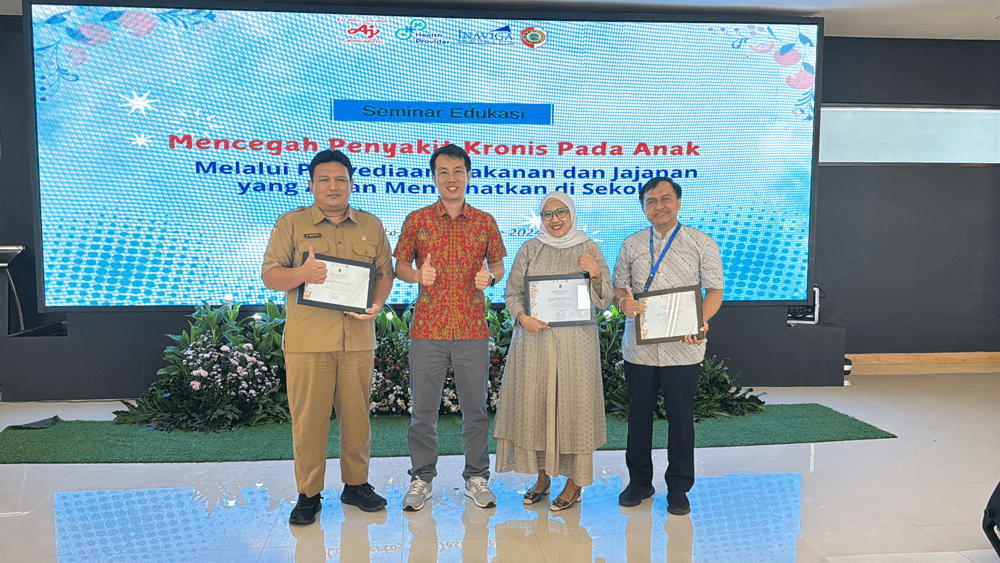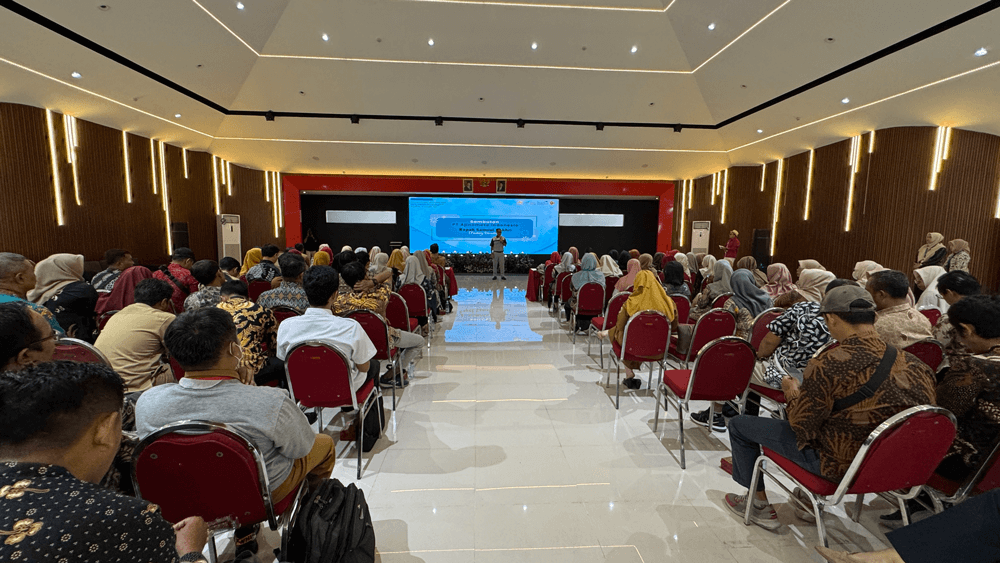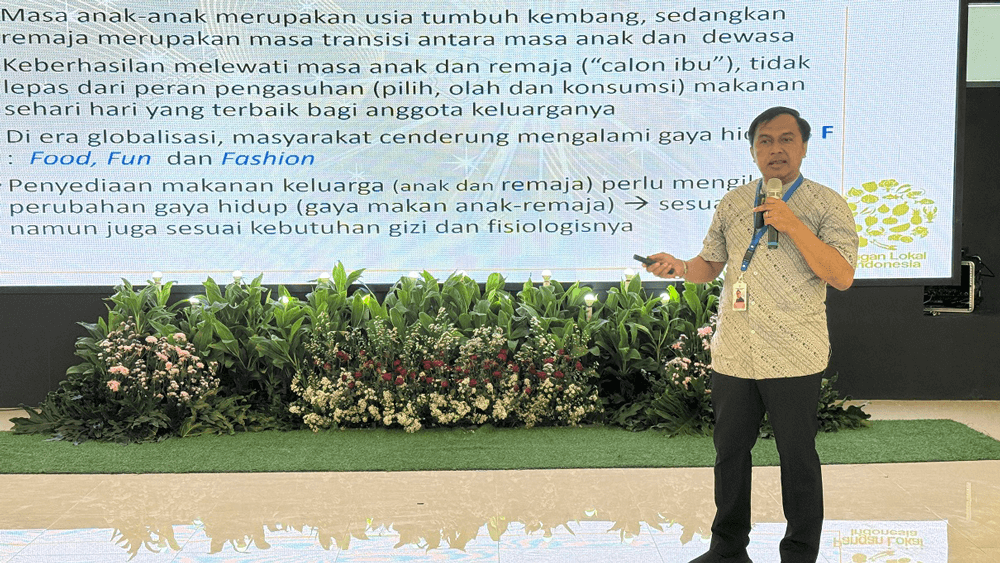Jakarta, Januari 2025 - Ajinomoto Indonesia Group (Ajinomoto) has a big goal, namely to become a company that ‘Empowering the sustainable well-being of all human-beings, our society and our planet with AminoScience’. One form of effort to achieve this big goal is to create activities that support the implementation of a healthy lifestyle in the community. Seeing the prevalence of chronic diseases in children that has increased in recent years, caused by the consumption pattern of snacks in school children that are high in sodium, sugar, and fat, Ajinomoto took the initiative to hold a series of educational seminars aimed at teachers in elementary schools who have an important role in maintaining health, as well as being role models for their students. So that children can avoid various potential chronic diseases as early as possible.

This series of Educational Seminars was given to more than 300 elementary school teachers in 3 cities (Karawang, Mojokerto & Jakarta), with material topics such as education on proper nutrition to avoid various chronic diseases, education on providing safe and healthy snacks in school canteens, and education on the concept of Wise Salt to avoid one of the chronic diseases in children, namely hypertension. In the educational seminar (in Mojokerto), one of the speakers was Prof. Dr. Ir. Annis Catur Adi, M.Si, Professor and Lecturer at the Faculty of Public Health, Airlangga University (UNAIR), who explained the risk of chronic diseases and other non-communicable diseases (PTM) in school-age children, as a result of a diet that does not meet balanced nutritional intake, and also Purnawati Hustina Rachman, S.Gz., M.Gizi, Lecturer at the Faculty of Human Ecology (FEMA) IPB, who explained the importance of providing a healthy canteen in the school environment. "The causes of nutritional problems in school-age children actually come from snacks that are not safe in terms of food quality. Therefore, providing a healthy canteen, with maintained food quality, and a place with adequate cleanliness, in the school environment is very important," said Hustina.

"To create a school canteen that can be categorized as a healthy canteen, 4 pillars (commitment & management, facilities and infrastructure, human resources, food quality) which are parameters need to be identified whether all of them are adequate. Then regarding the types of food and drinks currently provided in the school canteen, you as teachers can start categorizing them based on color (green, orange, red). Green means food and drinks that are recommended to be provided, orange means food and drinks that need to be limited, red means food and drinks that are not allowed. That way, you also contribute to accelerating the provision of a healthy school canteen," she continued.

Meanwhile, Prof. Annis Catur explained that understanding nutrition, consumption behavior, and a clean and healthy lifestyle can prevent us from various risks of chronic and degenerative diseases, not only in adults, but also in children.
"The increase in the curve of degenerative disease sufferers is inseparable from the unhealthy lifestyle of the community, including the wrong diet. Excessive consumption of sugar, salt, and fat can increase the risk of non-communicable diseases. These diseases can be prevented early if public awareness of a healthy lifestyle and diet is increasing," said Prof. Annis Catur.
"Therefore, it is very important for us as parents to be able to prepare and fulfill a good balanced nutritional intake for children, and no less important, we as parents at home, and teachers at school, can also ensure good sanitation in our environment. Because environmental cleanliness is also a factor in children being able to avoid infections and other infectious diseases," he continued.
On this occasion, Prof. Annis Catur also provided several steps in fulfilling a daily balanced nutritional intake and also ways to avoid the risk of metabolic diseases such as diabetes, high cholesterol, hypertension, and heart attacks in the future.
"Nutrition is the basis and foundation for the formation of quality human resources in order to achieve Golden Indonesia. Non-Communicable Diseases (PTM) can actually be prevented from an early age with good nutrition and a healthy lifestyle. Always read the nutritional information label of the products you buy, replace sugar with spices such as ginger, cinnamon, or nutmeg. Reduce or stop consuming carbonated drinks and replace them with regular mineral water, Limit the use of white sugar or syrup as a sweetener. Choose fresh or frozen fruit as a snack," said Prof. Annis.
"Then, to avoid the risk of metabolic diseases such as diabetes, high cholesterol, hypertension, and heart attacks in the future, it is important for us to be able to reduce our intake of sugar, salt, and fat, as recommended by the Indonesian Ministry of Health (Kemenkes). Furthermore, to reduce salt intake, sometimes when cooking our daily menu, we worry that if we use less salt, it will make the taste of the food less delicious. Well, I have a fairly easy way to apply it so that we can still make the food delicious, while reducing the use of salt, namely with the concept of Smart Salt. By reducing some of the use of salt in daily cooking activities, and replacing it by adding a little MSG, we can reduce salt intake, while maintaining the deliciousness of the food. For example, in cooking chicken soup, from the usual 2 teaspoons (tsp) of salt into 1 liter of broth, it is enough to change it to 1 tsp salt + ½ tsp MSG, with that we have implemented the concept of Smart Salt. Why is that? because MSG only has 1/3 of the sodium content compared to regular table salt, and many studies have stated that the use of MSG can reduce sodium (salt) intake, but the deliciousness of the food is still maintained," he continued.
According to Grant Senjaya - Head of Corporate Communications Dept - PT AJINOMOTO INDONESIA, the Ajinomoto Indonesia Group is actively campaigning for Smart Salt concept as one of the Ajinomoto Health Provider initiatives, in order to achieve the Ajinomoto Indonesia Group's big goal of becoming a company that ‘Empowering the sustainable well-being of all human-beings, our society and our planet with ‘AminoScience’. Ajinomoto Health Provider is an integrated sustainability initiative from the Ajinomoto Indonesia Group, including activities that support human health and environmental sustainability.
To find out more information about Ajinomoto Indonesia Group's products, services, and efforts through the Ajinomoto Health Provider initiative, all people can visit the Ajinomoto Indonesia website (https://www.ajinomoto.co.id/id).